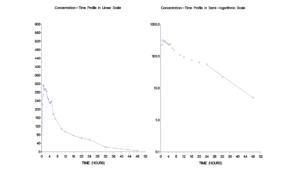Renal Impairment Clinical Trial: A scientific approach assessing the effect of renal disease on drug’s pharmacokinetics

Renal impairment is a common comorbidity for patients because of the disease itself, toxicity of treatments, or because of other factors affecting organ function, such as increased age.
Drugs are normally cleared from the human body by a number of routes, each of which can be characterized by a clearance value. The sum of these clearances (renal, hepatic, etc.) is the total or body clearance which is inversely proportional to the plasma concentration produced by a given drug dosage regimen. The quantitative contribution of each route of elimination to the metabolic fate of a drug is proportional to the clearance value of that route relative to the body clearance. The reduction in renal clearance of a drug caused by renal disease is proportional to the reduction in the renal clearance of creatinine.
Bioanalysis plays a crucial role in evaluating the pharmacokinetics of drugs in patients with renal impairment, given that impaired kidney function affects the renal clearance of drugs.
The metabolic clearance of many drugs is proportional to their free fraction (ratio of concentrations of free to total drug) in plasma. Since severe renal disease causes a reduction in the plasma protein binding of many drugs, the metabolic clearance of such drugs will be increased.
To compensate for the increased elimination of a drug during stages like hemodialysis, the dosing rate (i.e., the dose per unit of time) will have to be increased by the factor (hemodialysis clearance and body clearance): body clearance, where body clearance is that during a day between dialyses. Under certain conditions, an increased accumulation of pharmacologically active drug metabolites during renal failure becomes a matter of serious concern.
The physiologic perturbations associated with renal disease can have a pronounced effect on the pharmacokinetics of elimination of drugs and their metabolites from the body. The renal impairment pharmacokinetic (PK) clinical trial services can assess the Pharmacokinetic profile of a drug in patients with varying degrees of renal impairment mentioned above. The renal impairment clinical trial employed individuals with impaired kidney function and a control group with normal kidney function. The primary objective of the trial is to determine how the drug is metabolized and eliminated in individuals with renal impairment, comparing to the individual with normal kidney function.
The trial will be conducted in a randomized, double-blind design. Participants will be divided into at least three groups: a control group with normal renal function, groups with renal impairment with minimum of mild or moderate renal impairment based on their creatine clearance as per regulatory guidance (insert FDA guidance link here). The participants will be administered the drug at a fixed dose, and blood samples will be collected at various time points to measure the concentration of the drug in the bloodstream.
In order to obtain meaningful information from the renal impairment Pharmacokinetic clinical research study, a thorough statistical analysis must be conducted.
The pharmacokinetic parameters that will be evaluated in the trial include the maximum concentration (Cmax), the time to reach maximum concentration (Tmax), and the area under the concentration-time curve (AUC). These parameters will be used to determine how the drug is absorbed, distributed, metabolized, and eliminated in the body, and to compare the pharmacokinetics of the drug in individuals with normal renal function to those with impairment
The first step in the analysis is to assess the Pharmacokinetic parameters for each subject in the study. This includes calculating the AUC, the Cmax, the half-life (t½), and the clearance (CL). These values should be compared across the different groups of patients to evaluate the effect of renal impairment on the drug’s Pharmacokinetic profile.
The next step is to compare the Pharmacokinetic parameters across the different renal impairment groups. This can be done using a repeated measures ANOVA to assess the effect of renal impairment on the Pharmacokinetic parameters. This can be followed up with post hoc tests to identify which groups differ from each other significantly.
In addition to assessing the effect of renal impairment on the Pharmacokinetic parameters, the study should also assess the safety and tolerability of the drug in the different renal impairment groups by monitoring adverse events and laboratory parameters such as kidney function tests. This can be done by comparing the incidence of adverse events across the different groups, such as using a chi-square test or a Fisher’s exact test.
The results of the study should be presented in a clear and concise manner. This includes providing a summary of the Pharmacokinetic parameters for each group, comparing the PK
Regression analysis is a statistical method that to be used to evaluate the relationship between a dependent variable (such as the concentration of a drug in the bloodstream) and one or more independent variables (such as creatinine clearance), which are measures of renal function). Here are the general steps for performing a regression analysis of the pharmacokinetics of a drug in individuals with renal impairment
-
- Collect plasma concentration, calculate Pharmacokinetic parameters (mainly Cmax and AUC) as well as the creatinine clearance of individuals with renal impairment and normal functions.
- Select a regression model: There are several types of regression models that can be used, such as linear regression, polynomial regression, or non-linear regression. The choice of model will depend on the specific research question and the nature of the data.
- Perform the regression analysis: The next step is to conduct the regression analysis to estimate the parameters of the model and provide statistics such as the coefficient of determination (R²) and the p-value.
- Interpret the results: The final step is to interpret the results of the regression analysis. The regression coefficients can be used to estimate the relationship between the pharmacokinetics of a drug with creatinine clearance. This results will allow us to conclude if the renal function impairment will affect the pharmacokinetics of a given drug, and if there is a dosage adjustment for such patients during the treatment at different renal disease stages.
Renal impairment has a significant impact on the pharmacokinetics of drugs, leading to the need for careful monitoring and dosing adjustments in patients with impaired kidney function. Bioanalysis plays a crucial role in evaluating the pharmacokinetics of drugs in patients with renal impairment, while clinical trials can assess the pharmacokinetic profile of a drug in patients with varying degrees of renal impairment. A thorough statistical analysis of the pharmacokinetic parameters, including AUC, Cmax, and clearance, is necessary to evaluate the effect of renal impairment on the drug’s pharmacokinetic profile.
Regression analysis is a useful statistical method for assessing the relationship between a drug’s concentration in the bloodstream and renal function measures, providing valuable insights for drug dosing and treatment in patients with renal impairment. Overall, the pharmacokinetics of drugs in patients with renal impairment require careful consideration and evaluation to ensure safe and effective treatment.
Why Choose BioPharma Services?
BioPharma Services, a full-service CRO, can conduct the renal impairment pharmacokinetic clinical trials. We can provide a wide range of services to support the clinical trial, including study design, protocol development, regulatory submission, and project management. BioPharma Services can provide expertise in the development of pharmacokinetic assays and biomarker assays to measure drug concentrations and assess drug metabolism and elimination in patients with renal impairment. This can ultimately lead to better understanding of how drugs are metabolized and eliminated in patients with renal impairment and can help to guide drug development and dosing strategies for this patient population.
Written By: Juan He
Find out why BioPharma might be the right partner for you! Learn more about BioPharma Services and the wide array of bioanalytical services we provide.
BioPharma Services, Inc., a Think Research Corporation and clinical trial services company, is a full-service Contract Clinical Research Organization (CRO) based in Toronto, Canada, specializing in Phase 1 clinical trials 1/2a and Bioequivalence clinical trials for international pharmaceutical companies worldwide. BioPharma has clinical facilities both in the USA and Canada with access to healthy volunteers and special populations.



